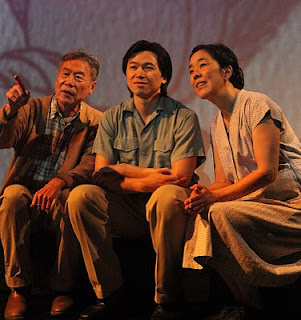By Joe Straw
Wow! No-No Boy is a wonderful new play by Ken Narasaki and directed by Alberto Isaac! Poetic and thought provoking this world premiere play is adapted from the novel by John Okada. Now playing March 26 – April 18, 2010 at the beautiful Miles Memorial Playhouse in Santa Monica, California.
No-No Boy is a title given to Japanese Americans when they answered “no” to the following two questions:
“Are you willing to serve in the armed forces for the United States on combat duty wherever ordered?”
“Will you swear unqualified allegiance to the United States of America and faithfully defend the United States from any or all attack by foreign or domestic forces, and forswear any form of allegiance or obedience to the Japanese emperor, to any other foreign government, power or organization.”
These questions, part of the 1943 Leave Clearance Applications Form, administered to interned Japanese Americans, were confusing. The first one suggested the prisoner was volunteering for the draft. The second implied the American citizen had already sworn allegiance to the Japanese emperor.
A no answer got the Japanese American out of the internment camp and into federal prison.
This is a play about the re-integration of the former prisoner Ichiro (Robert Wu) who has returned home in 1946 to resume a normal family life.
But the road back home has changed starting with Eto (Chris Tashima) who discovers Ichiro is a no-no boy and welcomes him back into society by spitting on him.
Ichiro walks into the back of the grocery store where he is warmly met by his Pa (Sab Shimono). Later, his Ma (Sharon Omi) greets him in true Japanese form. His brother Taro (Jared Asato), there also, is resentful of his brother and believes him to be a coward.
The home picture has gotten a little bleak when Ichiro discovers his Ma is delusional; believing the Japanese have won the war and a ship will come for them any moment to take them away.
Realizing reintroduction will not be an easy task, Ichiro finds a like-minded friend Freddie (John Miyasaki, March 26, April 12th and Mike Hagiwara, April 16 – 18) who has also answered in the negative. Freddie has found refuge with a woman in 2A (Emily Kuroda) who takes this man, as is, with no prejudices or discrimination for answering no.
Ichiro and Freddie go to a bar where they meet Kenji (Greg Watanabe). The wounds from the war eat at Kenji and thoughts of tearing Ichiro head off for being a no-no boy still gnaws in the pit of his stomach. But Kenji, remembering the war, has the capacity of forgive. And setting all differences aside, Kenji takes him to his former lover, Emi (Keiko Agena). They spend the night and Ichiro, who reminds Emi of her husband, sleeps with Emi.
There are moments in this play that defy gravity. Those moments feel like the play will soar and take you on one very exciting ride. And yet the momentum stops suddenly and you are left standing like a prisoner behind the wire.
For example, Ichiro’s return home does not seem like a grand homecoming, internally or externally. Certainly, he must find some joy in coming home after being away for two years. Also, Ichiro’s demeanor lacked an inner conflict that would have helped his physical life. That conflict being, “Did I make the wrong choice in saying no”. He must always question until he is satisfied that he finds the answer.
Secondly, Emi’s introduction to Ichiro, feels very flat. Emi doesn’t react to Ichiro’s likeness to her husband and when they finally get to bed there is no excitement as though they have done this for years. Minor adjustments in the action will only strengthen the play.
After all, what are the characters searching for? What do they want? Significant simple answers to complex conflicting problems will guide them toward the truth. Imaginative choices will propel the action.
Overall, this is a fantastic cast with some very nice performances despite a few problems.
Sab Shimono as Pa was just excellent. It was wonderful to see him telling stories with Japanese art projected on the wall.
Greg Watanabe was the heart of the show. He seemed to have an inner truth that guided his performance. Flawless execution. Nicely done!
Keiko Agena gave the show tenderness, as did Emily Kuroda warmth. Ken Narasaki, in a small role and with the best Japanese accent, was wonderful.
Robert Wu, a fine performer, is not as focused as he should be starting with his 70’s style haircut. There are many levels still yet to conquer not an impossible task given his range.
Sharon Omi as Ma started out fine. She takes pride that she is Japanese and that pride takes her to a tragic place from which she does not recover. For example, she waits breathlessly, looking over the horizon for the Japanese ship to take her back to Japan. She must be terribly heartbroken when they tell her the ship will never come.
Ken Narasaki, the writer, has taken the novel and made it into a very pleasurable play. While there is no Japanese spoken here there is a sense of ingrained culture embedded in this play. This makes the play all the more enjoyable.
Aaron Pagel choreographed the fight scenes, nicely done.
Alberto Isaac, the director, did a fine job. The death scenes were poetic. The opening is quite fantastic! Go see this play! If not for the historical significance to ask yourself the question, “What could the American Government have been thinking to put our citizens in internment camps?”


No comments:
Post a Comment